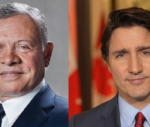You are here
Breaking the deadlock
Mar 13,2014 - Last updated at Mar 13,2014
As the standoff between the West and Russia continues over Crimea, the Moscow-backed referendum on the “annexation” of the Black Sea peninsula looms on the horizon.
The referendum, scheduled to take place on March 16, could seal not only the relations between the territory and Russia but also the relations between Moscow and Western capitals.
US President Barack Obama on Wednesday held a meeting with Ukraine’s new Prime Minister Arseniy Yatsenyuk at the White House in a show of solidarity with the new political order in Kiev. “We will stand with Ukraine,” Obama said at the conclusion of his talks with Yatsenyuk.
The G-7 nations have also voiced their utter rejection of the impending referendum on Crimea, calling any attempt to bypass international law in determining the fate of the contested territory an affront to legitimacy.
The G-7 statement calling on Russia “to cease all efforts to change the status of Crimea contrary to Ukrainian law and in violation of international law”, also sends a clear message on where the G-7 nations stand on the conflict, especially when it went on to warn that “the annexation of Crimea could have implications for the legal order that protects the unity and sovereignty of all states”.
Indeed it does.
If parts of countries decide to break away from the central government in a manner contrary to the constitution of the land, there could indeed be disorder in the world with no end to separatist movements.
Now all eyes are focused on the impending meeting between US Secretary of State John Kerry and his Russian counterpart Sergei Lavrov in London to defuse the deadlock over Crimea.
Kerry is reputed to be carrying with him some “ideas” on how to end standoff even though Russian President Vladimir Putin has stood firm against any understanding that would frustrate his bid to annex Crimea.
Putin speaks with experience having gotten away with “annexing” parts of Georgia in the 2008 war between Georgia and Russia on the pretext of protecting the peoples of the regions seized by force.
Yet the Kerry-Lavrov meeting offers not only a unique opportunity to end the standoff, but perhaps the only remaining effort to reconcile the differences between Moscow and Western capitals by accommodating, in part at least, the concerns of Moscow in the wake of the change of government in Kiev and the protection of the territorial integrity of Ukraine.
Failure of this last-ditch effort would be a very unfortunate regression in East-West relations in the 21st century when major powers need not resort to military means to reconcile their differences.













